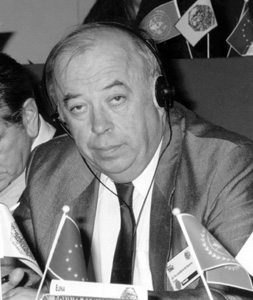JANUARY - Italy - Former Yugoslavia
9/12 JANUARY - Italy: Rome - IV Italian Congress of the Radical Party
10 JANUARY - Croatia: Zagreb - Former Yugoslavia
23 JANUARY - Italy: Rome - Death Penalty
25 JANUARY - Former Soviet Union: Moscow - Radical Assembly
25/27 JANUARY - Czechoslovakia: Prague / Italy: Rome - China / Tibet
29 JANUARY - Czechoslovakia: Prague - Antimilitarism
4 FEBRUARY - Italy: Rome - Human Rights, Sri Lanka
18 FEBBRAIO - Côte d’Ivoire: Abidjan - Civil Rights
13 March - EP: Strasbourg - Death Penalty
2 JULY - Croatia: Zagreb - Radical Assembly
3 JANUARY - Italy - Former Yugoslavia
The Radical Party appeals to Italian parliamentarians to take action against Serb aggression and for the recognition of Croatia and Slovenia.
9/12 JANUARY - Italy: Rome - IV Italian Congress of the Radical Party
On the afternoon of 9 January, before the Congress opened, signatures collected on the referendums promoted by the RP were presented to the Court of Cassation and a demonstration was held outside the Constitutional Court to launch the campaign to defend the nine referendums from the partyist jurisprudence of the latter Court.
Marco Pannella opens the proceedings with a report, and the Congress is divided into two sections dealing with: 1) the situation in the Former Yugoslavia and nonviolent Radical institutional initiatives; 2) political prospects, including the Italian pre-electoral situation.
The Congress elects a committee - made up of 15 people and a representative from each Radical organization, and including parliamentarians and regional councillors of the Radical Party, all of whom have the right to an advisory vote - whose task is to coordinate Italian Radical initiatives.
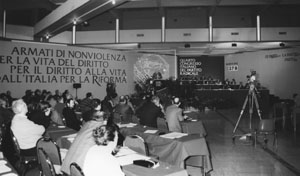
10 JANUARY - Croatia: Zagreb - Former Yugoslavia
Seven Serb deserters from the federal army join the Radical Party.
23 JANUARY - Italy: Rome - Death Penalty
A demonstration against executions is held outside the Cuban Embassy, shortly after Eduardo Diaz Betancourt is put to death.
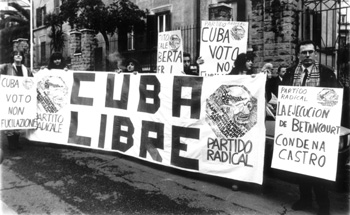
25 JANUARY - Former Soviet Union: Moscow - Radical Assembly
Emma Bonino takes part in the assembly held by Radicals from the Former Soviet republics.
25/27 JANUARY - Czechoslovakia: Prague / Italy: Rome - China / Tibet
Rally to protest against Chinese Prime Minister Li Peng’s visit to Italy.
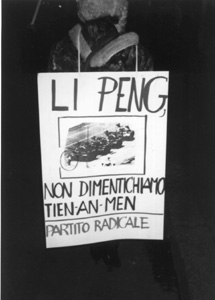
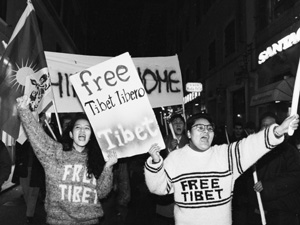
29 JANUARY - Czechoslovakia: Prague - Antimilitarism
Demonstration on the occasion of the Conference on Security and Cooperation in Europe.
4 FEBRUARY - Italy: Rome - Human Rights, Sri Lanka
Radical Party joins the demonstration for the respect of human rights in Sri Lanka, organized by the Movement for Democracy.
18 FEBBRAIO - Côte d’Ivoire: Abidjan - Civil Rights
Francis Wodie, national secretary of the Workers’ Party and member by right of the Federal Council of the RP, is arrested along with other exponents of the opposition parties. Stanzani and Bonino send letters to the President and the Prime Minister of Côte d’Ivoire, asking that the civil and political rights of those under arrest be respected.
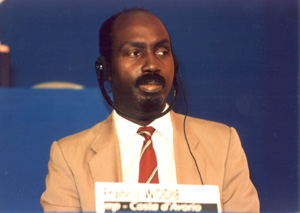
(Francis Wodie at the XXXVI Radical Party Congress)
13 March - EP: Strasbourg - Death Penalty
The resolution auguring the abolition of the death penalty in the Former Soviet Union, presented by Adelaide Aglietta, is approved by the European Parliament.
"The Radical Party campaign for the abolition of the death penalty in the Former Soviet Union, launched immediately after the failed putsch in August 1991, was distinguished by the fact that it operated both at the parliamentary and international level.
For all those who joined this campaign, starting with the Muscovites and all the other citizens of the country that until recently was known as the Empire of Evil, the initiative was seen as providing Washington and the other consolidated democracies that still inflict the death penalty, with an example of tolerance and juridical civility with which to confront themselves.
The political vicissitudes of the Former Soviet Union, particularly the resignation of Gorbachev and the birth of the Commonwealth of Independent States - whose future is anything but secure - have obliged us to rethink some of the stages of the campaign. We have asked Yeltsin, through his Ambassadors in the various European capitals, it we could meet with him to consign the signatures on the Manifesto-Appeal. In the meantime, at the Congress on 1 May, the Radical Party will devote ample time to the death penalty debate and the organization of the campaign: the Citizens’ and Parliamentarians’ League for the Abolition of the Death Penalty Worldwide by 2000".
The initiative flanks a Radical Party campaign for the abolition of the death penalty in the Former Soviet Union, which has collected signatures from hundreds of parliamentarians and prominent personalities from Africa, including Lmizana Sangoule, former President of Burkina Faso; Austria; Belgium, including the Vice-President of the Chamber of Deputies, Jean Mottard and Minister Elie Deworme; Canada; Czechoslovakia, including Deputy Prime Minister Jozef Miklosko and the President of the Czech Parliament Dagmar Buresova, while President Havel informed the RP that although he is very sympathetic towards the initiative he cannot, as Head of State, express an opinion through a petition; Croatia, including Deputy Prime Minister Zdravko Tomac, Minister Vladimir Veselica, both members of the Radical Party Federal Council, and Vice President of the Parliament Ivica Percan; Denmark; Finland; France, including the Vice President of the Senate Michel Dreyfus-Schmidt; Greece; Great Britain; Ireland, including former Prime Minister Garret Fitzgerald and Ministers Desmond O'Malley and Robert Molloy; Israel; Italy, including Flaminio Piccoli, Chairman of the Commission for Foreign Affairs and former leader of the Christian Democrat International; Latvia, including Foreign Minister Janis Jurkans and Moscow government representative Janis Petris; Malta, including Minister Ugo Mifsud Bonnici; Norway; Netherlands; European Parliament; Poland, Romania, including Vice Presidents of the Senate Karoly Kiraly and Vasile Mois, and Minister for the Environment, Marcian Bleahu; Slovenia, including Zoran Thaler, Deputy Foreign Minister and member of the Radical Party Federal Council; United States, including New York Governor Mario Cuomo; Sweden; Switzerland; Germany, including SPD Secretary Gregor Gysi; Hungary, including Rezso Nyers, who has held ministerial office several times, Minister Ferenc Jozsef Nagy, while President Arpad Goncz gave his support to the initiative but was unable to sign as Head of State; Former Soviet Union, including Yuri Afanasev, member of the dissolved Supreme Soviet.
Prominent figures who signed the appeal (about 200 throughout the world) include: Gore Vidal, Noam Chomsky, Coretta Scott King; Nobel Laureates Abdus Salam, Elie Wiesel and Mairead Corrigan Maguire; Elena Bonner-Sacharova; Antonino Zichichi and Marcello Mastroianni; François Fejto and Henri Laborit; Clark Ramsey, former Justice Minister in the Kennedy Administration; Nick Harman, leader writer for The Economist.
2 JULY - Croatia: Zagreb - Radical Assembly
Croatian, Bosnian and Slovenian Radicals elect Croatian Deputy Prime Minister Zdravko Tomac as President of the Radical organization TRS, a legally-recognized political group that does not participate in elections. Vice Secretaries of the RP Olivier Dupuis and Basile Guissou also take part in the assembly.
